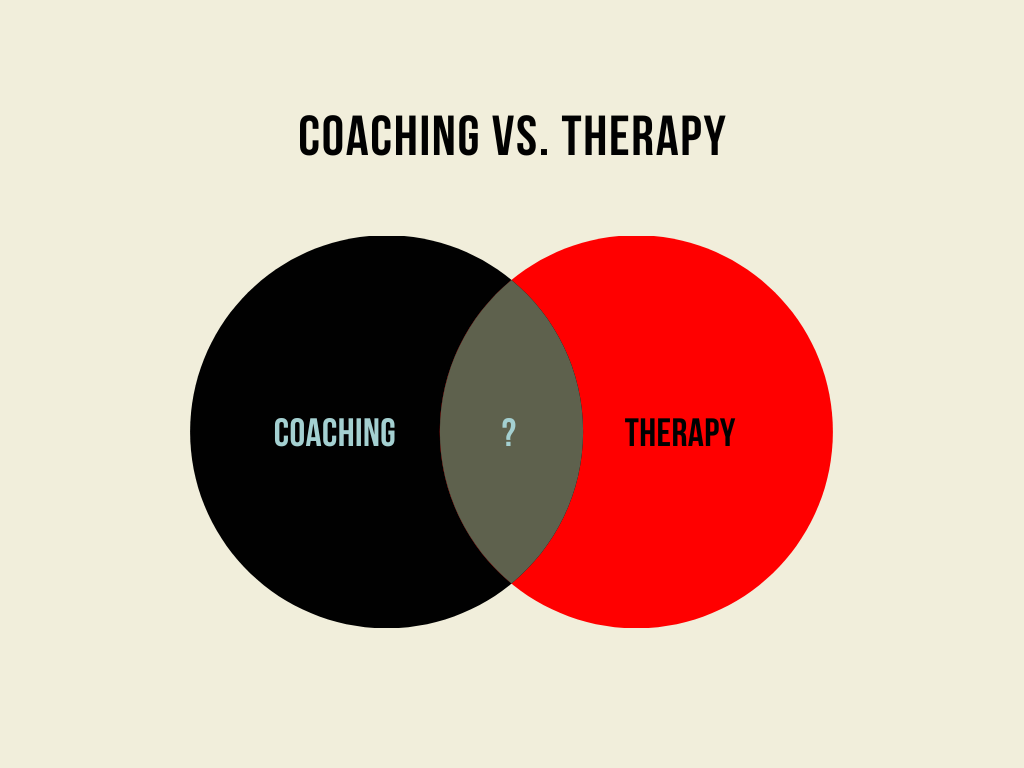COACHING VS. THERAPY
The Differences, Why One is Sometimes Better than the Other, and How to Know Which Way to Go.
First, for those of you who are new here - welcome.
You’ll notice that this newsletter is not coming to you from Substack. That’s because I’ve switched over to a new format through Squarespace. It’s easier for me (although I do miss the focus on writing over at Substack). Maybe I’ll switch back one day - but for now, this is what we’re going with.
Anyhow, onto the newsletter.
I’m sometimes asked - "Why isn't what you do considered therapy?"
A while back, I posted something on LinkedIn providing a brief answer to this question.
I thought it made sense to do a deeper dive. It's both a straightforward and layered question, and here's why: there is a lot of overlap and oftentimes, coaching can feel like therapy.
Yet, as someone who deeply values therapy, I also know where coaching (and my own approach) intertwines with three core distinctions that set it apart from therapeutic work.
The Overlap and Distinctions Between Coaching and Therapy
Many find the lines between coaching and therapy blurred, as both aim at fostering personal growth, better mental health and short- and long-term development.
Where they overlap:
1. Emphasis on Personal Development
Both coaching and therapy focus significantly on personal growth. They aim to improve individuals' lives, whether through enhancing mental health, increasing satisfaction in various life areas, or advancing career goals. This shared focus is where they most commonly overlap, providing a foundation for the individual’s broader development.
2. Use of Conversation for Insight and Change
In both coaching and therapy, conversation is a critical tool. Professionals in both fields use dialogue to uncover insights, challenge existing mindsets, and encourage new behaviors. Whether exploring past patterns in therapy or setting future goals in coaching, the power of conversation drives both practices.
3. Commitment to Client Empowerment
Empowerment is a key outcome for both coaching and therapy. Both aim to leave clients better equipped to handle their life situations. Whether through developing coping strategies in therapy or enhancing self-efficacy and problem-solving skills in coaching, the ultimate goal is to empower clients to manage their lives more effectively.
Where they are different:
1. Focused and Time-Limited Engagement
Coaching is distinctively structured as a short-term engagement, typically spanning three to six months. This is in contrast to therapy, which may extend indefinitely, exploring a broader spectrum of personal issues. Coaching focuses intensely on specific goals or transitions, particularly in professional contexts. This structured, time-bound approach has been supported by research, such as a study by Grant (2003), which highlights the effectiveness of targeted coaching in enhancing goal attainment, well-being, and resilience.
2. Forward-Looking Approach
Unlike therapy, which often delves into one's past to heal and understand, coaching is predominantly forward-looking. It starts with your current situation and sets its sights on future achievements and improvements. This method is aligned with Whitmore’s (2009) principles in Coaching for Performance, which stress the importance of unlocking a person's potential by concentrating on future possibilities rather than past experiences.
3. Practical Application and Pragmatism
The most defining feature of coaching is its pragmatic approach. While therapy explores the "why" behind behaviors and emotions, coaching focuses on the "how." It equips individuals with actionable strategies and tools to effect change, fostering actionable skills and mindsets that align with their objectives. The Evidence Based Coaching Handbook by Stober and Grant (2006) elaborates on how coaching uses practical techniques to initiate change effectively.
Which is the way to go?
Ultimately, it’s a personal decision. Or as lawyers like to say “It depends.”
I often say that if you want to understand why you are where you are or how you got here, try therapy. If you want to know how to get where you want to go, and develop strategies and tools to get there, go with coaching.
Together, they are a fantastic combination. Understanding yields better results in terms of forward movement, but having skills and resilience makes it easier to understand the past.
Cop out? I don’t think so.
Conclusion: The Complementary Roles of Coaching and Therapy
The line between coaching and therapy is finely drawn, with each playing a vital role in the domain of personal growth. Coaching offers a goal-oriented, future-focused, and pragmatic pathway for those looking to navigate life's challenges and transitions efficiently and independently.
As we continue to differentiate and value both practices, we open up new possibilities for personal and professional development. Whether you aim to redefine your career path or simply enhance your personal life, recognizing the distinct benefits of coaching and therapy can be transformative.
Questions to Consider.
What goals are you aiming to achieve?
How might understanding these differences enhance your approach to personal development?
References:
Grant, A.M. (2003). "The impact of life coaching on goal attainment, metacognition, and mental health." Social Behavior and Personality, 31(3), 253-264.
Whitmore, J. (2009). Coaching for Performance: GROWing Human Potential and Purpose. Nicholas Brealey Publishing.
Stober, D.R., & Grant, A.M. (Eds.). (2006). Evidence Based Coaching Handbook. John Wiley & Sons.
Moen, F., & Allgood, E. (2009). "Coaching and the effect on self-efficacy." Organization Development Journal, 27(4), 104-114.

